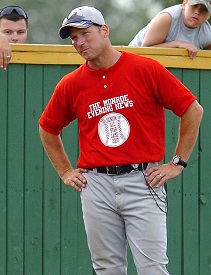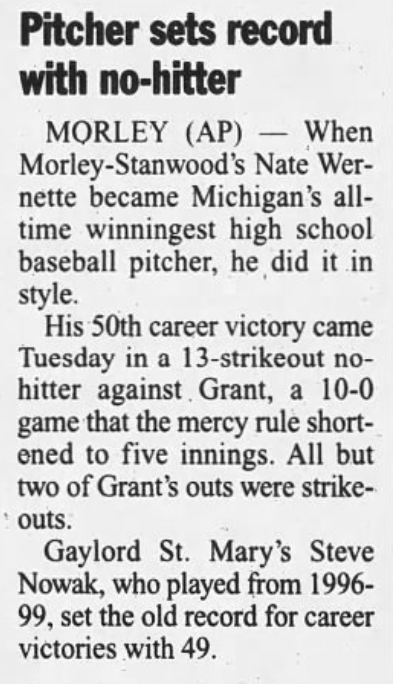
Sontag Inspires Amid 'Miracle' Cancer Fight
January 3, 2020
By Doug Donnelly
Special for Second Half
PINCKNEY – Dave Sontag could tell something was wrong.
 The gymnasium at Petersburg-Summerfield High School is bigger than most in Monroe County. But when Sontag, a veteran official, was running up and down the floor, he felt unusually tired and began feeling pain in his back.
The gymnasium at Petersburg-Summerfield High School is bigger than most in Monroe County. But when Sontag, a veteran official, was running up and down the floor, he felt unusually tired and began feeling pain in his back.
“I knew something was wrong,” Sontag said. “During a timeout, I told one of the other officials who was in the stands watching that he might have to finish the game.”
Sontag, however, pushed through and made it.
“That’s when it all began,” he said.
A few weeks later, as the Saline varsity baseball coach, Sontag was hitting fly balls to the Hornets’ outfielders.
“I was struggling,” he said. “I called the players in and told them something was wrong. I had to stop.”
Still trying to fight through whatever was wrong, Sontag was coaching third base during a Saline intra-squad scrimmage a short time later.
“I started to see white,” he said.
He had another member of the Saline coaching staff call his wife, Michelle, who came and picked him up and took him to the hospital in Chelsea.
“My blood counts were trash, just trash,” he said. “The doctors said I need to have a blood transfusion.”
He was rushed to a Detroit-area hospital for the transfusion. After tests, Sontag was diagnosed with acute lymphoblastic leukemia, an extremely vigorous, aggressive cancer. That was May 15, 2018.
During the 18 months since, Sontag has gone through chemotherapy and radiation treatments. He’s watched multiple communities respond with fundraisers and benefits and amazing support. He’s had more than one bone marrow transplant. He’s heard from countless friends and ex-players who have continued to lift his spirits day after day via e-mails and text messages. He’s been counted out more than once.
Yet, he’s survived.
“Every day has been a challenge,” he said.
***
Sports and Sontag have gone together from the beginning.
He is a Monroe County native who was The Monroe Evening News Player of the Year in baseball in 1978 and went on to play at the University of Toledo. He taught journalism and English at his alma mater, Monroe Jefferson, before becoming a counselor for another 12 years. He was also the Jefferson director of athletics and recreation for a time.
 He coached baseball for the Bears, leading the team to nearly 400 victories and the Division 2 championship in 2002. He stepped down from coaching to follow his kids, who were playing at higher levels; Ryan Sontag played at Arizona State University and in the Chicago Cubs organization. Susan played softball at Bowling Green State University, and Brendan played ball at Indiana Tech University.
He coached baseball for the Bears, leading the team to nearly 400 victories and the Division 2 championship in 2002. He stepped down from coaching to follow his kids, who were playing at higher levels; Ryan Sontag played at Arizona State University and in the Chicago Cubs organization. Susan played softball at Bowling Green State University, and Brendan played ball at Indiana Tech University.
Still, the desire to coach never left their dad.
“After my kids were done playing, I coached freshman baseball at Jefferson,” he said. “I missed it and still wanted to be part of it.”
With his wife a principal in the Saline district, Sontag was asked by Scott Theisen, Saline’s head coach, to join his staff in 2015. He was with the Hornets when they captured the Division 1 championship in 2017, then was named head coach before the 2018 season started.
“That was the year I got sick,” he said. “I didn’t even finish the year.”
Sontag also has been a basketball official for years, getting his start in the early 1980s. He’s been a registered MHSAA high school basketball official for 40 years and has trained officials for the Monroe County Basketball Officials’ Association. He’s called four MHSAA Finals championship games.
“My first varsity game ever was when I was 21,” Sontag said. “I refereed a game at Whiteford.”
***
Sontag previously battled non-Hodgkin’s lymphoma in 1995-1996, beating that disease after a nine-month battle.
Although this cancer battle began as he was new to the Saline community, they embraced his fight, selling “Team Tags” T-shirts and painting the youth baseball diamond with a big ribbon. His son, Ryan, was invited to throw out the first pitch before the youth baseball season started in Dave’s honor.
Back home, in Monroe County, Sontag’s school held similar fundraisers and blood drives.
“I had so much support,” he said. “It was quite amazing to see.”
He tried all sorts of treatments, ultimately boarding an airplane and heading to Seattle for a clinical trial. It didn’t work.
“At that point, I didn’t think I was going to live,” Sontag said. “They told me there was nothing more they could do. They just were giving me something to take the pain away. I was miserable.”
Still, Sontag said, he held out hope.
“I felt it wasn’t time yet,” he said. “I have three grandkids. There are things I want to do. There’s so much I haven’t accomplished yet. In Seattle, they didn’t count on me living.”
But, for a still-unexplained reason, a combination of the medicine he was given to “take the pain away,” on his flight home and a different medicine he received when he returned to Michigan, started to change the way he felt. His blood counts started getting better.
“The side effects were lousy, but, for some reason, it threw me into remission. They checked for leukemia and it was not there.
“We called it a miracle.”
***
Sontag, who lives in Pinckney now, is still dealing with the side effects of nearly two years of treatments. He has a tingling sensation in his arms and legs – the feeling people get when their hands or feet ‘fall asleep’ – and he has a weak immune system.
 But he gets a little better every day.
But he gets a little better every day.
“Every day is a blessing,” he said.
In addition to the community support and constant praying, he credits his wife with guiding him through this process.
“Michelle has been a rock through all of this,” he said. “She’s been by my side every single day. Without her, I don’t know if I would have made it.”
Recently, the Monroe County Officials’ Association held a banquet during which Sontag was presented with a “Courage Award.” He isn’t sure if he’ll be able to referee again anytime soon.
“I told them that night that I’d like to do it again, somewhere,” he said. “I don’t care of it’s a seventh-grade game. I just want to get out there again.”
In addition to the outpouring of love from multiple communities, family and friends, Sontag said sports has kept him alive.
“Sports is part of my fabric,” he said. “Baseball and officiating basketball games has given me that motivation I’ve needed to fight through this. I don’t know if I will coach again or referee again. I’m definitely not going to jump into the same schedule. But there are things I would like to do.
“Will I become a head coach again? Probably not. The task of being a head coach is probably too big right now. But I’d like to be involved. I’d still like to run camps and clinics. I’d still like to officiate too. I want to be a part of it. It’s something that’s in my blood.”
His son Ryan lives in Saline and has three children. Ryan coaches his son in a youth baseball league.
“He called me the other day and asked if I’d help him out,” Dave Sontag said. “I told him I think he will get me out there at some point.”
 Doug Donnelly has served as a sports and news reporter and city editor over 25 years, writing for the Daily Chief-Union in Upper Sandusky, Ohio from 1992-1995, the Monroe Evening News from 1995-2012 and the Adrian Daily Telegram since 2013. He's also written a book on high school basketball in Monroe County and compiles record books for various schools in southeast Michigan. E-mail him at [email protected] with story ideas for Jackson, Washtenaw, Hillsdale, Lenawee and Monroe counties.
Doug Donnelly has served as a sports and news reporter and city editor over 25 years, writing for the Daily Chief-Union in Upper Sandusky, Ohio from 1992-1995, the Monroe Evening News from 1995-2012 and the Adrian Daily Telegram since 2013. He's also written a book on high school basketball in Monroe County and compiles record books for various schools in southeast Michigan. E-mail him at [email protected] with story ideas for Jackson, Washtenaw, Hillsdale, Lenawee and Monroe counties.
PHOTOS: Longtime official and coach Dave Sontag – standing in front row with wife Michelle, daughter-in-law Amy and son Brendan – is presented a “Courage Award” by the Monroe County Officials Association. (Middle) Sontag, formerly baseball coach at Monroe Jefferson and Saline, mans his spot on the baseline. (Below) Sontag with officials, from left, Mike Gaynier, Mike Bitz, Mike Knabusch and Dan Jukuri. (Top and below photos courtesy of Knabusch; middle photo courtesy of the Monroe News.)

Decades Later, Wernette's Wondrous 2003 Remains Nearly Unchallenged
By
Steve Vedder
Special for MHSAA.com
April 24, 2023
Nate Wernette knew his final spring at Morley Stanwood had been special, but he had no idea just how historic it was until a strange visitor showed up at the family home near Stanwood just weeks after the baseball season ended.
The man, completely unknown to the family, produced a number of framed newspaper clippings and several pages of well-documented statistical research on Wernette's recently completed senior season at Morley Stanwood. The numbers showed that Wernette, a pitcher whose skill set fell somewhere between being a hard thrower and crafty left-hander, had accomplished even more than suspected at first glance.
In fact, the research showed that Wernette's senior year arguably was the single greatest pitching season in the history of Michigan high school baseball.
"We never had any idea," said Wernette on the eve of the 20th anniversary of that historic season in 2003.
Wernette was vaguely aware that his 20 pitching wins had broken the state record of 19 wins set by Brandon LaTour of Blissfield in 1992. The pair remain among only four pitchers in state history with at least 17 wins in a single season.
But as the man's research pointed out, that feat was just the tip of the iceberg. The 20 wins pushed Wernette's career total to 56, a state record that remains seven better than Homer's Josh Collmenter's eventual total of 49 from 2001-04. What Wernette also didn't realize was his 272 season strikeouts smashed the previous record of 215 by Southgate Aquinas’ Dan Horvath from 1998 and would outlast a challenge of 223 by Collmenter in 2004, and that Wernette’s average of 15.2 strikeouts per game was at that time second (and now fourth) all-time in state history. Wernette finished his career with 583 whiffs, second in state history.
He also tossed four no-hitters that season, second on the all-time list. Three of those no-hitters, in fact, came in consecutive dominant starts from May 6-10.
While Wernette was pitching himself into the Michigan high school record book, National Federation of State High School Associations (NFHS) research shows where Wernette's numbers stand nationally. It turns out that only 10 pitchers in the country's history have won more than 20 games in a season. The all-time mark is 25 by Randolph Slaters of Mooreville High School in Missouri in 1985. Wernette’s 272 strikeouts is fourth all-time, with Salters also holding that record at 336. The 56 career wins is sixth all-time, with Terry Heiderscheit of Lansing Kee High School in Iowa holding the record of 69 from 1975-78.
Wernette admits it's probably best that he was unaware of the records at the time. His focus was on being the only senior on a young 10-player Morley Stanwood team that many suspected would be lucky to break .500 in 2003. But behind Wernette's sensational season, Morley Stanwood finished 41-3, with Wernette suffering his only defeat 3-1 to Blissfield in the Division 3 championship game.
"I was kind of glad I didn't know. Who knows what would have been in the back of my mind if I knew I was that close (to the records)," he said. "I never thought that much about it. I didn't know about the strikeout record, and I never looked at my (won-loss) record until someone mentioned that I was close to 50 and that I could break the state record."
Wernette remembers starting about 17 games that season as at least a couple of the wins came in relief. The success also didn't exactly come out of the blue as Wernette went 7-5 as a promising freshman, then put together 14-3 and 15-4 seasons as a sophomore and junior, respectively. The 15 wins remain tied for 10th all-time in state history.
Wernette's catcher his final season was sophomore Drew Thompson, who remembers Wernette as having a fastball that touched 90 mph at best. He never threw a curveball until making the high school team and really didn't master it until his last season and a half for Morley Stanwood. But Wernette, an all-conference football linebacker, had a relentless competitive streak, Thompson recalled.
 "There was his velocity and the way he threw balls that tailed away from batters," Thompson said. "A lot of high school hitters never saw balls that would move away like that. But he was a gamer who just wanted the ball in his hand. If he got into trouble, he wanted a strikeout and he had the stuff to do it.
"There was his velocity and the way he threw balls that tailed away from batters," Thompson said. "A lot of high school hitters never saw balls that would move away like that. But he was a gamer who just wanted the ball in his hand. If he got into trouble, he wanted a strikeout and he had the stuff to do it.
"Everything fit together for him that year. He had confidence we would win whether we were down 1-0 or 2-1 or we were up. I remember him always being relaxed."
Wernette agrees everything indeed did fall into place that season. One of four Mohawks pitchers who could throw at least 80 mph, Wernette's place in the rotation included starting twice during the week while occasionally relieving in a weekend tournament. By the time the team was around 16 games into the season, Wernette realized something special was happening. The team played well in the usually strong Big Rapids Tournament, where the Mohawks swept Remus Chippewa Hills and Big Rapids. Morley Stanwood split a key doubleheader with Howard City Tri County, and suddenly Wernette and a painfully young Morley Stanwood club that virtually had returned little else than its No.1 pitcher was catching fire.
Wernette's 20th win came in a 3-2 decision over Rudyard in a Quarterfinal at Gaylord. Because rain on Tuesday had pushed the game back a day to Wednesday, Wernette was unable to start the team's Semifinal on Friday. But even without Wernette, the team's No. 3 hitter and first baseman when he wasn't on the mound, Morley Stanwood beat a 35-4 Goodrich team 4-3 in the Semifinal, paving the way for Wernette to pitch the Final. But Morley Stanwood made a couple key errors in the title game, and Blissfield pitcher Jake Recker – who had only a modest 4-4 record heading into the day – was excellent in a 3-1 win. The championship was part of three Finals titles over four years for Blissfield.
Wernette said his reflections on his heavy pitching load that season haven't changed in 20 years. He would take the ball whenever coach Ron Ford asked him.
"I never told him I couldn't pitch," Wernette said. "My arm never bothered me. I'd ice it after a game, and I never had an arm issue. Looking back now I know I threw more than a lot of high school pitchers, but I was all for it. I wanted the ball every chance I could get it."
While Wernette never suffered a sore arm during four years in high school, his pitching career ended five months after graduation. After attending a Detroit Tigers tryout in Grand Rapids, Wernette was advised he needed a year in college. So he shuffled off to Muskegon Community College, where during the opening weeks of fall ball, Wernette hurt his shoulder during a long toss exercise. While medical evaluations have made great strides in the last 20 years, Wernette said the numbness he felt probably meant a torn rotator cuff. He never tried pitching again.
"I probably should have stuck with it, and that's the biggest thing with me because baseball was so special," he said. "I took the game seriously, but the rest of it – like school – I wish I would have put more into it.
Wernette's spark for pitching is reflected in his two young daughters, Brooklynn, 11, and Jaycee, 8. Both are travel softball pitchers. Wernette said the family has a pitching machine set up to hone their talent.
"They're definitely into it," he said.
The records that Wernette set are probably untouchable as high schools have instituted tight mandates on the number of pitches that can be thrown over a certain number of days. For instance, the top pitchers on last year's 16 MHSAA semifinalists averaged 10.6 starts and 57.5 innings pitched. Wernette threw 125 innings as a senior.
Wernette heartily agrees there should be definite pitch limits on youngsters whose arms are not fully developed.
"I definitely see it as a good thing," he said. "Back then you never heard much about Tommy John surgeries of rotator cuffs. I never learned about that stuff until after school. I never had any concerns; I just wanted the ball every chance I could get it."
As for Wernette's remarkable season, he spends little time thinking about the achievements unless someone mentions them. But it's hardly comparable to the Bruce Springsteen "Glory Days" song of yesterday's greatness.
"Somebody will bring it up, and I have a lot of good memories. But I wish I would have done some things differently like paying more attention to school and applying myself. There was too much of just trying to get by," he said.
"But it was an honor to accomplish what I did. I'll always think that."
PHOTOS (Top) Morley Stanwood’s Nate Wernette makes his move toward the plate during the 2003 Division 3 Final against Blissfield. (Middle) Wernette’s record-setting win made the statewide news wire, appearing in various newspapers including as this clip in the St. Joseph Herald-Palladium.

